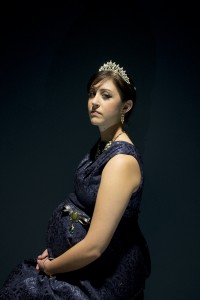
Shakespeare’s The Winter’s Tale might be best known and remembered for a specific stage direction, “exit, pursued by a bear.” Although this direction gives an accurate depiction of the play as surprising and intense, there is more to it than meets the eye. The Winter’s Tale offers audiences an experience not seen in many plays: both a tragedy and comedy in one. This Dec., for the first time in a few years, the Colorado State University Theatre takes on a full-length Shakespeare play, sharing with the audience one of his greatest, yet most under-rated works.
CSU’s Production of ‘The Winter’s Tale’
Led by director, and CSU Theatre Professor Eric Prince, the technical elements and acting techniques have fused to create a modern world depicting themes of family, love, and loss. “I believe The Winter’s Tale may be one of the strongest student Shakespeare shows you are ever likely to see,” says Prince. “We are all working hard and are really committed.”
At every level, this show is a major challenge the department has fully embraced and built into a powerful story for all audiences. The tale opens with a slideshow of a new family in their happiest days, which is later juxtaposed with a family left in turmoil and sadness. It follows Leontes, King of Sicilia and his gentle wife, Hermione. Leontes ends up becoming suspicious that his wife may have been having an affair with his close friend and King of Bohemia, Polixenes. After the apparent death of Hermione, the play switches from a tragic tale to a light-hearted story following her neglected daughter sixteen years later. This Shakespearean production is unique in two distinct ways: first, it is set in modern day, and second, it takes place in two very different worlds.
“I wanted to make it as accessible as possible for a modern audience,” explains Prince as to why a modern time period was chosen. “I was also influenced by the Royal National Theatre in London’s production of Othello which helped me see the play in a completely fresh, exciting way.”
The time frame has made quite the impact on costume designer, Devin Anders, and set designer, Roger Hanna. “The textual references of items of clothing or professions and things that don’t exist in the same way, I would say,” says Anders, “was one of the biggest challenges.”
Putting the play in a modern setting has also helped spotlight certain themes. A major theme is gender roles and the modern set design has helped to emphasize this idea. “The world of the play is definitely a place where men rule and women are treated savagely,” explains Hanna. Set pieces like a 20-foot desk belonging to Leontes and 10-foot doors used as a major focal point all help to define the masculine feel of the first half of the play.
Another major challenge everyone involved faced was the juxtaposition between scenes in Sicilia and Bohemia. Sicilia, where the whole first half of the show takes place, has a classic royal feel and is ruled by Leontes and Hermione. Bohemia, on the other hand, is placed in a much more relaxed country setting and dominates most of the second half. Costuming helps out a lot in this respect, with Anders explaining that “the overall goal of my design was to visually add to, and enhance, the high contrast in the show.” Therefore, the characters in Sicilia wear business professional suits, ties, skirts, and heels. Everything is sleek and sophisticated. Then we get to Bohemia where the characters sport jeans, bolo ties, and overalls as they sing around bales of hay. As far as the set goes, projections play a huge role in creating the new, fresh world of Bohemia. The giant doors that set the tone in Sicilia will have left, leaving space for the projections to produce a coherent composition for this shift in time and place.
Perhaps the play is summed up best by a line from Mamillius, son of Hermione and Leontes: “A sad tale’s best for winter. I have one of sprites and goblins.” Although it is a story of intense emotion, The Winter’s Tale also makes room for adventure and even a bit of magic. And if you were excited about seeing the famous stage direction take place before your eyes, you most certainly will not be disappointed.
Don’t miss out on your chance to see that and more from William Shakespeare’s The Winter’s Tale, taking place in the University Theater Dec. 4, 5, 10, 11, and 12 at 7:30 p.m., and Dec. 6 and 13 at 2 p.m. Click here to purchase tickets.
